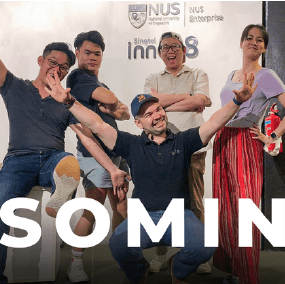Background
Objective
Aiming at bringing more light on key economic and population health factors affecting the disease spread, this initial study utilizes a quantitative statistical analysis based on the most recent publicly available COVID-19 datasets.
Methods
In this technical demonstration, we showcase the World's first personality-driven marketing content generation platform, called SoMin. ai. The platform combines deep multi-view personality profiling framework and style generative adversarial networks facilitating the automatic creation of content that appeals to different human personality types. The platform can be used for enhancement of the social networking user experience as well as for content marketing routines. Guided by the MBTI personality type, automatically derived from a user social network content, SoMin. ai generates new social media content based on the preferences of other users with a similar personality type aiming at enhancing the user experience on social networking venues as well diversifying the efforts of marketers when crafting new content for digital marketing campaigns.
Human personality traits are the key drivers behind our decision-making, influencing our life path on a daily basis. Inference of personality traits, such as Myers-Briggs Personality Type, as well as an understanding of dependencies between personality traits and users' behavior on various social media platforms is of crucial importance to modern research and industry applications. The emergence of diverse and cross-purpose social media avenues makes it possible to perform user personality profiling automatically and efficiently based on data represented across multiple data modalities. However, the research efforts on personality profiling from multi-source multi-modal social media data are relatively sparse, and the level of impact of different social network data on machine learning performance has yet to be comprehensively evaluated.
Press About Us

A digital twin is precisely what its name suggests: A digital copy of a physical object or system—even a human being. It may be a simple concept, but the potential applications are anything but. Through the ongoing collection and exchange of data, a digital twin can simulate and even predict the behaviors and reactions of its physical twin in a variety of conditions, providing invaluable insights to industries ranging from manufacturing to healthcare.
Digital twin technology allows businesses and organizations to test products and processes, study and predict how real-world conditions can affect physical objects and beings, and make well-informed, big-impact decisions with minimized financial and human safety risks. Below, 16 members of Forbes Technology Council share some of the fascinating ways industries and organizations are leveraging digital twin technology.

Anyone with an eye on the business world knows that tech professionals across industries saw their roles and responsibilities take a huge leap forward with the onset of widespread remote and hybrid work in the wake of the Covid pandemic. Even before that, tech leaders and their teams—both those working for tech-focused companies and those in other industries—had already been having an increasingly large impact on the ways their companies operated.
And while changing workplaces and markets are adding new challenges, there are also “evergreen,” ongoing issues that tech leaders will likely always need to wrestle with, even as they help fellow leaders learn to lean on the unique perspective a tech expert can bring to overall business strategy. Below, 16 members of Forbes Technology Council share the new (and ever-present) priorities they’re dealing with and why they’re so important.

A look inside Investible's backing of SoMin.ai, a startup revolutionising the digital marketing industry.
Earlier this year, Investible backed Singapore-based SoMin.ai, a deep-tech marketing technology that leverages machine learning to give marketers a better return on their advertising spend investment. The business is led by co-founders Aleksandr Farseev (CEO) and Kirill Lepikhin (CTO), a technical and incredibly savvy duo intimately familiar with the sector they have begun to disrupt.
Traditional marketing approaches are not cost-efficient. It can be difficult for marketers to correlate the money spent on a marketing campaign with revenue from sales (i.e. return on marketing spend). Currently, one way to measure and test advertising campaigns is iterative A/B testing through focus groups. With the introduction of machine learning and natural language processing, there are now ways to derive insights that reflect the wider market and not just select sample sizes. Big data algorithms now have the capability to scrape data from user-generated content (e.g. what consumers have liked on Instagram) and use it to create an intimate understanding of consumer behaviour.
